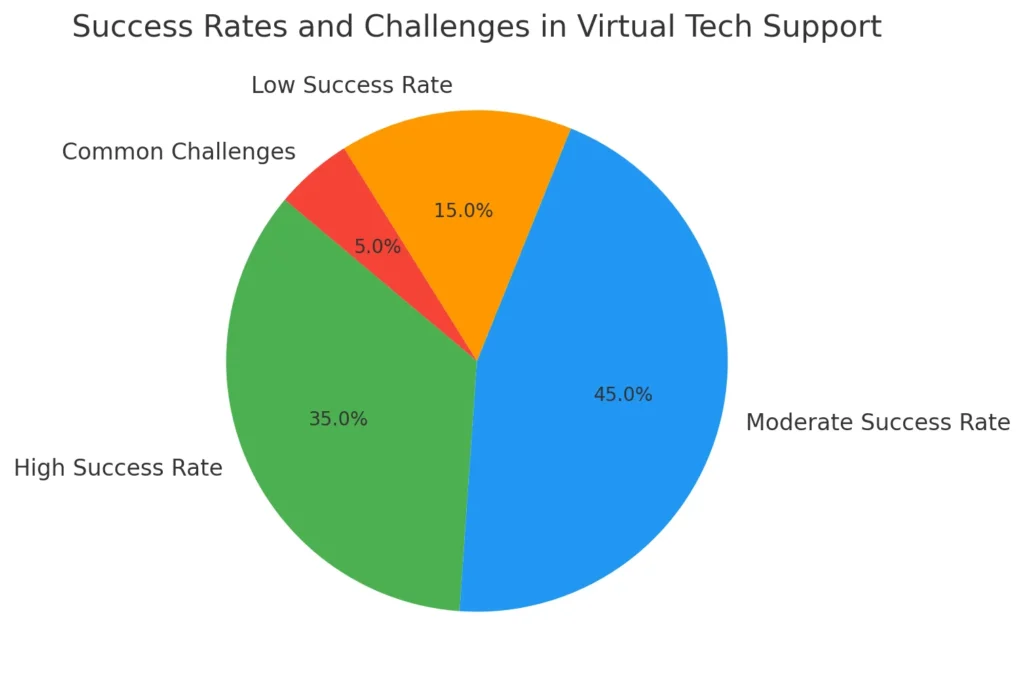In a world where technology continues to shape every aspect of our lives, the demand for virtual tech support is rising faster than ever. As businesses and individuals become increasingly dependent on digital solutions, they require reliable, accessible tech support to keep their operations smooth and secure. For aspiring entrepreneurs, this presents a unique and profitable opportunity to enter the growing virtual tech support industry. From offering personalized assistance to troubleshooting complex systems remotely, a tech support startup can cater to a broad range of needs while operating flexibly from virtually anywhere.
With advancements in technology like artificial intelligence, cloud computing, and remote access tools, starting a virtual tech support business has never been more attainable. This article explores ten top ideas to help you launch a successful virtual tech support startup that aligns with the demands of today’s tech-driven world.
| Metric | Data/Statistics | Description |
|---|---|---|
| Global Market Size (2024) | $35 Billion | Current market size of the virtual tech support industry, showcasing significant demand. |
| Annual Growth Rate | 10% | Expected annual growth rate, indicating consistent expansion and opportunity in the field. |
| Remote Work Adoption | 70% of businesses offer remote support | A reflection of the growing trend in remote tech support, especially in the post-pandemic era. |
| Top Growth Drivers | AI, cloud computing, cybersecurity demand | Key technologies and factors propelling the growth of virtual tech support. |
| Projected Market Size (2030) | $55 Billion | Estimated future market size, highlighting the long-term viability of the industry. |
Why Choose Virtual Tech Support?
In today’s hyper-connected world, technology powers everything from daily routines to complex business operations. As remote work, cloud computing, and smart devices become the norm, the need for dependable tech support continues to grow. Virtual tech support meets this demand by eliminating geographical limitations—enabling experts to assist clients anytime, anywhere. This approach not only streamlines support by saving time and reducing costs, but also ensures quick, effective resolutions to critical technical challenges.
For aspiring entrepreneurs, entering the virtual tech support industry offers a wealth of opportunities. The appeal lies in its flexibility, scalability, and relatively low startup costs compared to traditional brick-and-mortar businesses. You can operate from the comfort of your home or set up a remote team, reaching a global clientele. The industry is driven by continuous technological advancements, ensuring a steady stream of customers needing assistance with new devices, software updates, and cybersecurity threats.
The growth potential is immense. As technology evolves, so does its complexity, leading to a greater need for expert support services. Businesses are increasingly outsourcing their tech support to specialized virtual providers to reduce overhead costs and improve efficiency. By tapping into this market, you can position your startup at the forefront of a rapidly expanding industry, ready to meet the ever-growing needs of both businesses and individual consumers.
Read more:- Top 10 Ideas for IT Consulting Business Startups in 2025
Current Trends and Future Opportunities in Virtual Tech Support
| Trend/Technology | Description | Impact on Virtual Tech Support |
|---|---|---|
| Artificial Intelligence | AI-driven chatbots and automated diagnostics for faster issue resolution | Reduces wait times, enhances customer experience, and frees up human resources for complex issues |
| Cybersecurity | Increased focus on protecting against online threats | Creates demand for specialized support in malware protection, encryption, and security training |
| Cloud Computing | Shift to cloud-based business operations | Expands the need for support in cloud maintenance, troubleshooting, and security |
| Internet of Things (IoT) | Growth in smart devices and IoT adoption | Increases demand for remote tech support to manage and troubleshoot smart home and IoT devices |
The virtual tech support industry is evolving at lightning speed, driven by advancements in technology and shifts in consumer behavior. Today, businesses and individuals are looking for on-demand, efficient solutions to keep their systems running smoothly. As a result, virtual tech support has become not just a convenience but a necessity.
One major trend reshaping the industry is the integration of artificial intelligence (AI). AI-powered chatbots and automated diagnostic tools are enabling faster responses, reducing wait times, and even solving basic issues independently. This not only enhances customer experience but also allows tech support providers to focus on complex tasks requiring human expertise.
Another critical area is cybersecurity. With increasing online threats, clients are prioritizing secure systems more than ever before. This trend presents a golden opportunity for tech support businesses to offer specialized services, such as malware protection, data encryption, and security training for remote employees.
Cloud computing is also transforming the landscape. Many businesses now rely on cloud-based platforms for their daily operations, making them highly dependent on virtual tech support for smooth performance, maintenance, and troubleshooting. This trend is expected to grow as more organizations move to the cloud, providing ample opportunities for support startups.
Looking ahead, the future of virtual tech support will likely include more remote support for Internet of Things (IoT) devices and smart home technologies, as these continue to gain popularity. By staying on top of these trends, a virtual tech support business can cater to a dynamic, tech-savvy audience and capitalize on the growing demand.
Read more:- Top 10 Ideas for IT Support and Troubleshooting Business Startups
Top 10 Ideas for Virtual Tech Support Business Startups
Starting a virtual tech support business opens up a wide range of service opportunities. By identifying specific needs within the tech support landscape, you can cater to diverse customer segments, from small businesses to individual tech users. Here are ten promising business ideas to consider, each with its unique market, requirements, and potential for profitability.
| Business Idea | Startup Cost | Target Market | Profit Potential |
|---|---|---|---|
| Remote PC and Laptop Repair Services | Moderate | Individual users, small businesses | High |
| Cybersecurity Consulting | Low to Moderate | Small to medium businesses, remote workers | High |
| Software Installation and Troubleshooting | Low | Freelancers, remote teams, small businesses | Moderate |
| Cloud Support Services | Moderate | Companies using cloud services | High |
| Smart Home Device Support | Low to Moderate | Homeowners, small offices with smart devices | Moderate |
| IT Training and Education | Low | Businesses, educational institutions, individuals | Moderate |
| Virtual Network Setup and Maintenance | Moderate | Remote teams, freelancers, small businesses | High |
| Data Backup and Recovery Services | Moderate to High | Small businesses, individuals | High |
| Help Desk Support as a Service | High | Companies outsourcing support | High |
| Mobile Device Support and Management | Moderate | Companies with mobile workforces | High |
1. Remote PC and Laptop Repair Services
- Why: With the increasing reliance on remote work, many clients need dependable repair services that don’t require in-person visits.
- Startup Requirements: Basic diagnostic tools, remote access software, and repair skills.
- Target Market: Individual users and small businesses.
- Estimated Costs: Moderate.
2. Cybersecurity Consulting
- Why: As cyber threats rise, individuals and companies are seeking expert guidance on security protocols.
- Startup Requirements: Knowledge of cybersecurity practices, tools for security audits.
- Target Market: Small to medium-sized businesses and remote workers.
- Estimated Costs: Low to moderate.
3. Software Installation and Troubleshooting
- Why: Many users require assistance with software setup and troubleshooting.
- Startup Requirements: Familiarity with popular software, troubleshooting skills.
- Target Market: Freelancers, remote teams, small businesses.
- Estimated Costs: Low.
4. Cloud Support Services
- Why: As businesses migrate to cloud platforms, they need experts to manage and troubleshoot cloud environments.
- Startup Requirements: Cloud computing expertise, experience with platforms like AWS, Azure, or Google Cloud.
- Target Market: Companies and individuals using cloud services.
- Estimated Costs: Moderate.
5. Smart Home Device Support
- Why: The rise of IoT has led to an increased demand for support with smart home devices.
- Startup Requirements: Knowledge of IoT devices, remote access tools.
- Target Market: Homeowners and small offices with smart devices.
- Estimated Costs: Low to moderate.
6. IT Training and Education
- Why: With the surge in remote work, many companies need their staff trained on various IT tools.
- Startup Requirements: Training materials, video conferencing tools.
- Target Market: Businesses, educational institutions, and individuals.
- Estimated Costs: Low.
7. Virtual Network Setup and Maintenance
- Why: Remote teams require secure networks, making network setup a valuable service.
- Startup Requirements: Networking knowledge, secure connection tools.
- Target Market: Remote teams, freelancers, small businesses.
- Estimated Costs: Moderate.
8. Data Backup and Recovery Services
- Why: Data loss can be devastating, so clients are willing to pay for reliable backup solutions.
- Startup Requirements: Backup software, cloud storage options.
- Target Market: Small businesses and individuals.
- Estimated Costs: Moderate to high.
9. Help Desk Support as a Service
- Why: Businesses often outsource help desk services to reduce overhead and streamline support.
- Startup Requirements: Help desk software, trained support agents.
- Target Market: Companies looking to outsource support services.
- Estimated Costs: High.
10. Mobile Device Support and Management
- Why: With the rise of BYOD (Bring Your Own Device), companies need support for various mobile devices.
- Startup Requirements: Knowledge of mobile device management, remote troubleshooting tools.
- Target Market: Companies with mobile workforces.
- Estimated Costs: Moderate.
Real-World Examples
The virtual tech support industry is filled with inspiring examples of businesses that started small and scaled up by meeting the real needs of today’s tech-dependent world. These real-world examples highlight how identifying a niche and consistently delivering quality service can lead to success, even in a highly competitive market.

One such example is a startup offering specialized cybersecurity consulting for small businesses. By focusing on affordable, tailored security services, this business quickly built a loyal client base. Its success stemmed from helping smaller companies—those unable to afford full-time security teams—secure their data and systems in a cost-effective way. This startup now services multiple industries, from retail to healthcare, proving that addressing specific pain points can make a big impact.
Another example is a virtual cloud support service that began by helping small firms navigate the shift to cloud-based systems. This company used a simple approach: a remote team available around the clock to troubleshoot cloud issues and train clients on cloud usage. Their customer-focused model allowed small companies to migrate their data with confidence, which ultimately positioned the service as a go-to solution provider for cloud support.
Mistakes to Avoid When Starting a Virtual Tech Support Business
| Common Mistake | Description | Preventive Measure |
|---|---|---|
| Underestimating Customer Service | Focusing only on technical solutions without a customer-first approach | Prioritize clear communication and empathy in client interactions |
| Lack of Specialization | Trying to cover all areas of tech support, leading to diluted expertise | Focus on a niche like cybersecurity or cloud support to build reputation |
| Failing to Stay Updated with Industry Changes | Not keeping up with evolving technology and security updates | Regularly attend training, webinars, and stay informed on tech trends |
| Overlooking Data Security | Inadequate measures to protect client information | Invest in robust security protocols and educate clients on safe practices |
| Insufficient Marketing Efforts | Relying solely on word-of-mouth or limited promotion | Develop a basic marketing plan with online visibility and client outreach |
Starting a virtual tech support business can be rewarding, but it comes with its own set of challenges. To make a strong start and avoid costly missteps, it’s essential to be aware of some common mistakes that new tech support startups encounter. Recognizing these pitfalls early on can help you set your business on the path to success.
One of the most frequent mistakes is underestimating the importance of customer service. Technical expertise is crucial, but a large part of tech support is guiding clients through their issues with patience and clarity. A friendly, customer-first approach is essential, especially when dealing with clients who may not have a technical background. Overlooking this aspect can lead to frustrated customers and lost business opportunities.
Another key pitfall is not specializing in a specific niche. The tech support field is broad, and trying to offer every possible service can dilute your expertise. Instead, focusing on a specific area—such as cybersecurity, cloud support, or mobile device management—allows you to build a reputation as a specialist, which can attract clients looking for tailored solutions.
Additionally, failing to keep up with industry changes can be detrimental. Technology evolves quickly, and tech support businesses need to stay current with new tools, security updates, and software changes to provide effective support. Regularly updating your skills and understanding the latest tech trends is essential to remain competitive.
Why Trust Miracuves Solutions for Your Next Project?
Choosing the right partner for your virtual tech support project can make all the difference between a smooth, successful launch and a challenging journey. Miracuves Solutions stands out as a trusted choice due to its commitment to delivering innovative, customized tech solutions tailored to meet the specific needs of each client. With years of experience in the tech industry, we understand the unique demands and challenges faced by startups in the virtual tech support arena.
At Miracuves Solutions, our focus is on empowering businesses by offering end-to-end support, from initial concept to final deployment. Our team of experts brings both technical proficiency and a customer-centric approach, ensuring that each project is built to exceed expectations. By working with us, you gain access to a partner who values your success as much as you do, providing insights and support at every step of the process.
Whether you’re looking to create a scalable tech support service, build an innovative solution, or need guidance on industry best practices, Miracuves Solutions is here to help turn your vision into reality. With a proven track record of success, our team is dedicated to creating impactful, reliable solutions that not only meet the market’s demands but also set your business apart.
Conclusion
The virtual tech support industry is ripe with opportunities for those ready to tap into the growing demand for reliable, remote assistance. With the right idea and a customer-focused approach, a tech support startup can thrive by addressing real-world needs in a market that shows no signs of slowing down. Whether you choose to specialize in cybersecurity, cloud support, or smart device troubleshooting, success is within reach for those who prioritize quality service and keep pace with technological advancements.
Starting a virtual tech support business allows you to build a flexible, scalable model with the potential for significant impact. As you embark on this journey, remember that preparation, a strong understanding of your market, and a commitment to continuous learning are essential for long-term success. Take the first step, leverage the insights shared here, and start building your path to success in the dynamic world of virtual tech support.
FAQs
What is the first step to starting a virtual tech support business?
Begin by choosing a niche, such as cybersecurity or software troubleshooting, and research your target audience’s specific needs. This focus will help you design tailored services that stand out in the market.
How much does it typically cost to start a virtual tech support business?
Startup costs can vary, but a basic setup for remote tech support, including software and tools, can start from a few hundred to a few thousand dollars, depending on the services you plan to offer.
Do I need any certifications to provide tech support services?
While certifications aren’t always required, credentials in areas like IT, cybersecurity, or cloud computing can boost credibility and help you gain client trust, especially for specialized services.
What tools are essential for running a virtual tech support business?
Key tools include remote access software, diagnostic and troubleshooting tools, communication platforms, and cybersecurity software to ensure safe and efficient support.
How can I attract clients to my tech support startup?
Start by building a strong online presence, using targeted marketing, and leveraging platforms like social media. Offering free initial consultations or competitive rates can also help attract your first clients.
Related Articles:
Top-Rated Food Delivery App Development Company for Startups & Enterprises
Top 10 Ideas for Digital Resume Services Business Startups – Complete Guide
How to Build an App Like Practo: Full-Stack Developer’s Guide
Most Profitable Education Apps to Launch in 2025








